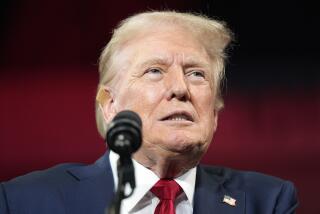Italy’s highest court strips Berlusconi of immunity protection
- Share via
ROME AND LONDON — Italy’s highest court Wednesday overturned a law granting Prime Minister Silvio Berlusconi immunity from prosecution while in office, a major blow for a seemingly Teflon leader whose business dealings and personal peccadilloes have come under increasing fire.
The highly anticipated ruling threw a question mark over Italy’s political scene and the future of its longest-serving premier since World War II. Berlusconi, a billionaire businessman-turned-politician, is now likely to come under pressure to resign or to call a snap election as a bribery trial against him reopens after being put on hold with passage last year of the immunity law.
At the least, analysts say, the Constitutional Court decision will further distract his government as it grapples with the global recession and as Berlusconi continues to dodge embarrassing allegations that he allowed prostitutes to attend parties at his home.
The prime minister’s lawyers had suggested that he might quit if the ruling went against him, but Berlusconi vowed Wednesday to carry on governing as the head of a center-right coalition in parliament.
“We go ahead,” Berlusconi told reporters outside his residence in Rome. He added that any legal proceedings against him were “real farces” and that he felt “invigorated” by the adverse ruling.
For all the accusations of shady business practices and improper fraternization with comely young women, Berlusconi, 73, remains popular with much of the Italian public, although his polling numbers have slipped of late.
The court decision sparked glee among Berlusconi’s detractors, who are routinely appalled by what they see as his clownish antics, crude comments and control of a vast media empire that helps protect his image from assault.
Critics accused him of manipulating the judicial system to shield himself from legal action. The immunity law, which was passed last year at the start of Berlusconi’s third term as premier, exempts top officials such as the president and the prime minister from prosecution while in office.
The law’s immediate effect was to suspend the trial in Milan in which Berlusconi was charged with bribing a British lawyer to lie in his favor in other corruption probes dating to the 1990s.
Two other court proceedings against the premier, including one involving alleged bribery of senators, were also stopped and can be reopened.
Berlusconi is also thought to be considering putting himself forward for the presidency when his term as prime minister runs out, a post that under a separate immunity measure would shield him from prosecution for several more years.
Wednesday’s ruling -- along with the ongoing allegations that he has consorted with call girls and, in one highly publicized case, an 18-year-old part-time model -- could set back such ambitions, said political analyst Franco Pavoncello, who is president of John Cabot University in Rome.
“The president of the republic is a highly symbolic figure . . . the father figure of the country,” Pavoncello said, adding that he was “not sure that after that kind of publicity, it would be easy for [Berlusconi] to go to parliament and get the nomination.”
The immunity law’s supporters contend that it is necessary in order for Italy’s government to function properly, without leaders constantly being tied up in court, and that it mirrors the situation in some other European countries.
Berlusconi’s allies say he has been the object of a vast left-wing conspiracy, composed of judges, lawyers, rival politicians, grass-roots activists and others intent on bringing him down. Wednesday’s ruling was further proof of that for Berlusconi supporters -- “a political verdict,” said Paolo Bonaiuti, the prime minister’s spokesman.
In its decision, the 15-judge panel said the immunity measure violated the core principle that all are equal before the law. The judges also said that any modification of that precept was a constitutional change requiring more than just a simple law passed by parliament.
It was the second time that the high court has thrown out an immunity law benefiting Berlusconi. An initial version was overturned in 2004; last year’s legislation was an amended second attempt.
In arguments before the court this week, Berlusconi’s lawyers hinted that their client might have to step down if his immunity were lifted, raising the specter that the country could be plunged into political chaos.
But chaos is in many ways the natural state of the Italian political scene, where 24 prime ministers have led 38 governments since late 1945. During the two days that the high court deliberated, Berlusconi’s allies began backing away from the threat that he might resign.
Piero Fassino, leader of one of the opposition parties, called on Berlusconi to accept the court’s decision, which cannot be appealed.
“He should respect the verdict,” Fassino said, according to the Italian news agency Ansa.
“I hope now that Berlusconi and the right-wing majority finally put aside the conspiracy theory and that an acceptance prevails that the Constitutional Court decisions are to be respected.”
Pavoncello, the analyst, said Berlusconi will face some embarrassing moments, which the political opposition will hope to capitalize on.
“We will see him entering and exiting courthouses and speaking during trials, being asked by judges to give embarrassing testimony,” Pavoncello said.
“We reopen the game. Hunting season is open again; we have to see what happens.”
--
De Cristofaro is a special correspondent.
More to Read
Sign up for Essential California
The most important California stories and recommendations in your inbox every morning.
You may occasionally receive promotional content from the Los Angeles Times.














